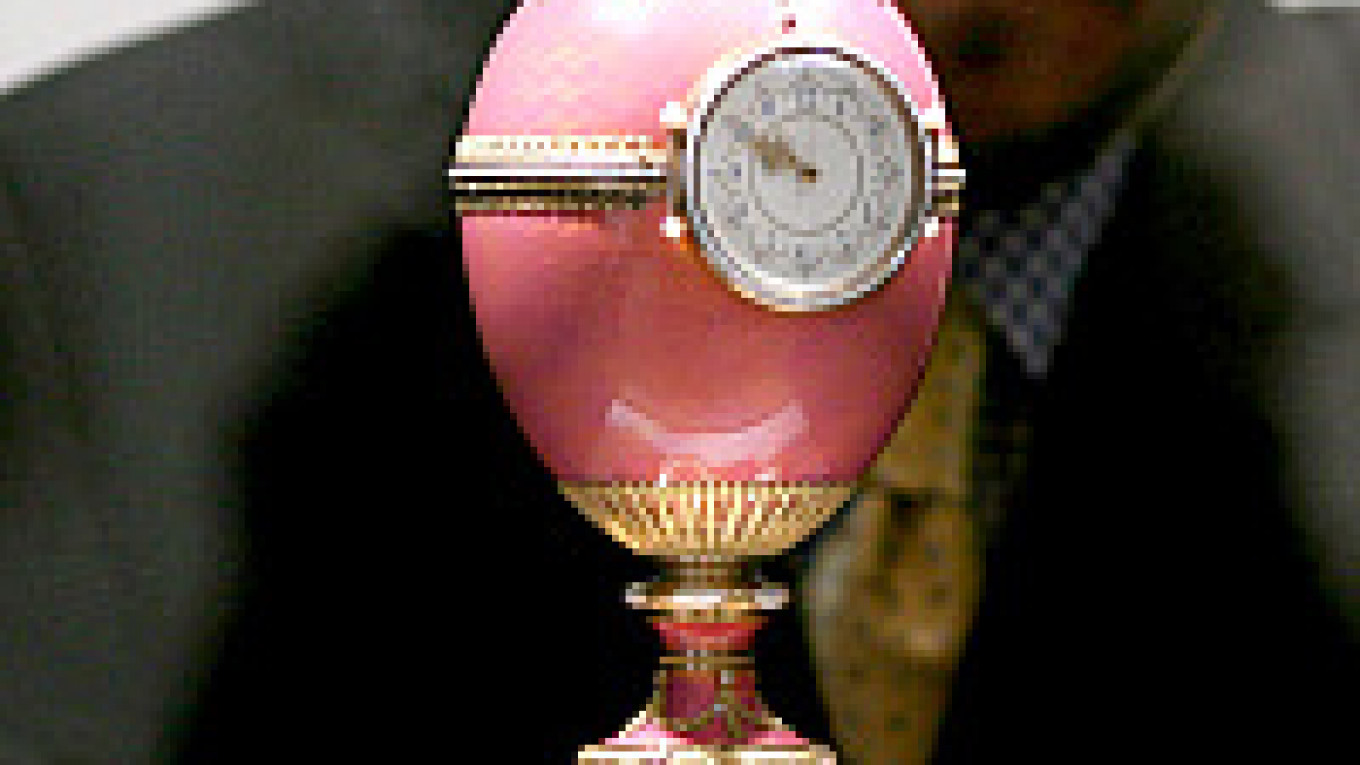The world's largest art seller has a £9 million ($18.6 million) top estimate for the gold-and-enamel egg, part of a five- day sale of Russian 19th- and 20th-century art that Christie's predicts will fetch between £26.5 million and £38 million. The auction record for a Russian decorative work is held by Faberge's Imperial Winter Egg, an Easter present from Czar Nicholas II to his mother in 1913, which sold at Christie's in New York for $9.6 million in 2002.
"Some say the Rothschild egg is not an Imperial egg, and so not worth the estimate we're asking," said Alexis de Tiesenhausen, head of Christie's Russian art department. "But I say, show me an egg with such impeccable provenance, one that has been in the same family for 100 years."
Christie's and rival Sotheby's are holding their largest-ever Russian sales next week as they compete for buyers in one of the world's fastest-growing art markets. Eight years of economic growth has swollen the ranks of rich Russian collectors, fueling a 10-fold gain in prices of the nation's artworks since 2000.
Faberge was Russia's most prestigious jeweler. From 1885 to 1916 the company made 50 Easter Eggs for the Imperial family. It also made eggs for wealthy non-royal clients and these have previously commanded lower values at auction.
The Rothschild egg, which will be offered Wednesday, was publicly displayed for the first time in October at a Christie's exhibition in Moscow. The 1902 piece, an engagement gift to Baron Edouard de Rothschild, has a clock and a diamond-set cockerel that pops up every hour and flaps its wings.
Christie's will also offer paintings, Orthodox icons, rare books and silverware during the week.
A selection of early 20th-century paintings goes on sale Wednesday, including Yuri Annenkov's "Portrait of Alexander Tikhonov" (1922), with a high estimate of £1.2 million. The cubist work, a mixed media piece with oil, collage, glass, and plaster, was exhibited at the Soviet pavilion at the 1924 Venice Biennale. The European owner bought it at Christie's in 1989 for £110,000.
A French family is offering 52 lots of Konstantin Somov's artworks worth as much as £2 million. Most are works on paper, but the top lot is an oil-on-canvas, "The Stroller's Rest" (1939), with a high estimate of £500,000.
Among the books and manuscripts for sale Thursday is the 1856 coronation album of Tsar Alexander II, valued at up to £80,000.
MacDougall Arts, a London auction house specializing in Russian art, is also getting in on the week's action with sales Thursday and Friday.
The company is aiming for its biggest Russian sale to date -- between £10 million and £14 million of 19th- and 20th-century Russian paintings. In June, the company sold £6.5 million of Russian art.
MacDougall's top lot is Konstantin Makovsky's "The Murder of False Dmitry" (1906), with a high estimate of £1 million. The 2 meter-by-3 meter canvas, from an American collection, depicts the riotous murder in 1606 of a man claiming to be Tsar Dmitry, son of Boris Godunov.
"We have had extraordinary growth since our first auction three years ago, vindicating our belief that there was space for a third auction house in the Russian art market," said William MacDougall, general director. "The biggest change has been the rise in postwar and contemporary Russian art over the last year."
One of the top contemporary lots is Komar and Melamid's "Yalta Conference, Judgement of Paris" (1985-86), valued at as much as £200,000. The 3 meter-by-1.5 meter canvas casts the Yalta Conference that divided Europe after World War II in the context of Greek mythology. Joseph Stalin, Winston Churchill, and Franklin D. Roosevelt appear as semi-naked Greek goddesses with female breasts. Adolf Hitler is a grossly muscular Paris giving an apple to Stalin, stressing the likeness between Europe's two bloodiest dictators.
A Message from The Moscow Times:
Dear readers,
We are facing unprecedented challenges. Russia's Prosecutor General's Office has designated The Moscow Times as an "undesirable" organization, criminalizing our work and putting our staff at risk of prosecution. This follows our earlier unjust labeling as a "foreign agent."
These actions are direct attempts to silence independent journalism in Russia. The authorities claim our work "discredits the decisions of the Russian leadership." We see things differently: we strive to provide accurate, unbiased reporting on Russia.
We, the journalists of The Moscow Times, refuse to be silenced. But to continue our work, we need your help.
Your support, no matter how small, makes a world of difference. If you can, please support us monthly starting from just $2. It's quick to set up, and every contribution makes a significant impact.
By supporting The Moscow Times, you're defending open, independent journalism in the face of repression. Thank you for standing with us.
Remind me later.


